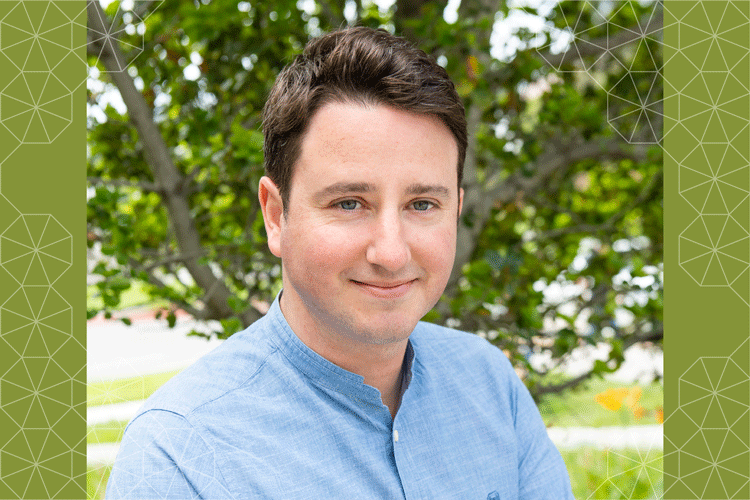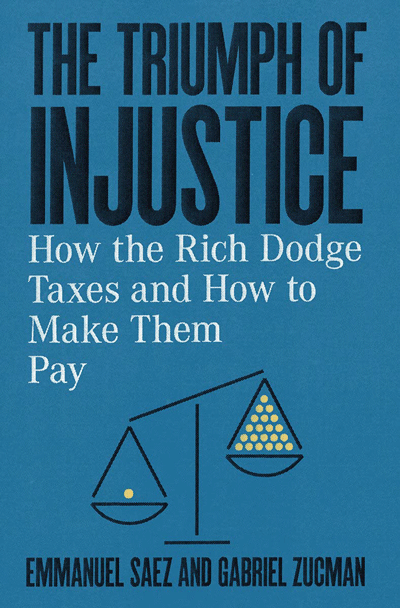Berkeley economist Gabriel Zucman wins prestigious Clark Medal
A pioneering researcher in tax evasion and economic inequality wins an honor reserved for an elite corps of young economists
May 2, 2023

UC Berkeley economist Gabriel Zucman explores massive datasets to understand how the economy favors the super-rich — and the costs paid by the middle and lower economic classes. (Photo by Genevieve Shiffrar)
Gabriel Zucman, a UC Berkeley economist who has helped propel globally influential research on tax avoidance and economic inequality, today was awarded the John Bates Clark Medal by the American Economic Association (AEA).
The medal, given annually to an economist under the age of 40, is second in prestige only to the Nobel Prize in economics, and several past winners have gone on to win the Nobel. In announcing the award, the AEA cited Zucman’s innovative research and wide-ranging influence, accomplished in just a decade after receiving his Ph.D.
“Through his entrepreneurial and creative pursuit of new data and methods for economic measurement, Gabriel Zucman has uncovered a range of fundamentally important facts quantifying the importance of tax evasion and measuring the rise of top income and wealth inequality,” the AEA said in announcing the award.
Colleagues at Berkeley echoed that praise.
Zucman’s “innovative work on the drivers of inequality, particularly wealth inequality, and his development of policies to reduce them, has been game-changing,” said Berkeley sociologist Raka Ray, dean of the Social Sciences Division.
“Gabriel has been able to revolutionize our understanding of tax evasion of the wealthy and tax avoidance of big multinational corporations,” added fellow economist Emmanuel Saez, who won the Clark Medal in 2009. “It is hard to think of any other young economist whose research has had such an impact, both in the academic debate and the policy debate.”
In an interview, Zucman described the medal as an honor — not just for himself, but for the entire economics department at Berkeley.
“I’m very grateful for this honor,” he said. “Most importantly, I’m grateful for the colleagues, the students, the co-authors and the mentors who have worked with me over the years. Research is really a collaborative process, and none of this research would have been possible without all of them.”
Zucman is co-director of the James M. and Cathleen D. Stone Center on Wealth and Income Inequality at Berkeley. He is currently on leave from Berkeley and working at Ecole Normale Supérieure–PSL in Paris and the Paris School of Economics, where he received his Ph.D. in 2013. He joined the Berkeley faculty in 2015.
He is the fourth current faculty member in the economics department to win the Clark Medal. Besides Saez, Emi Nakamura won in 2019; labor economist David Card won in 1995, then went on to win the Nobel Prize in 2021.
To improve economic policy, improve measurement tools
In the span of a decade, Zucman has established a body of work defined by data-driven research, innovative and sometimes provocative policy ideas and a commitment to teaching.
He has won both an Andrew Carnegie Fellowship and a Sloan Research Fellowship. He has helped to shape the views of top political figures and developed high-powered, data-driven online tools that allow policymakers, journalists and others to track virtually in real time how U.S. economic policy shapes the distribution of wealth.
Zucman emphasizes the technical dimensions of his work: an ambitious use of massive databases that help to shed light on the dynamics of income and wealth.
“A lot of my work is about trying to improve our measurement tools,” he explained in the interview. “So it’s really about designing better ways to measure economic activity, whether it’s income in wealth inequality or whether it’s tax avoidance or tax evasion. … It’s a fundamental part of any science — basic measurement work. That’s what I’ve tried to do.”
And yet, he has applied that technical skill to some of the most challenging — and sometimes controversial — economic and human challenges of our time: the policies and ploys that global corporations and the super-wealthy use to hide their income and shield it from taxes, and the effect that such practices and related government policies have on the middle and lower economic classes in the U.S. and worldwide.
“He did it,” Saez explained, “by exploiting data nobody had used before for such purposes: international financial flows revealing gaps due to offshore tax evasion, leaks from banks managing offshore accounts of wealthy evaders linked to their tax returns at home, detailed statistics of foreign branches of multinationals revealing profit-shifting to tax havens.
“Crucially, he was able to distill these complex data into clear and understandable analysis that colleagues, the press, policymakers and the public at large could finally understand.”
How government policy protects and serves the wealthy
 The picture that has emerged from Zucman’s research is of a global economy in many ways wired to the advantage of the super-rich, who divert their profits to offshore tax havens and thereby avoid paying taxes. While they get more wealthy, the middle class shrinks, and the poor increasingly find their poverty a trap that cannot be escaped.
The picture that has emerged from Zucman’s research is of a global economy in many ways wired to the advantage of the super-rich, who divert their profits to offshore tax havens and thereby avoid paying taxes. While they get more wealthy, the middle class shrinks, and the poor increasingly find their poverty a trap that cannot be escaped.
The “main fault line in the American society is … between the 1 percent and everybody else,” Zucman and Saez argued in their book The Triumph of Injustice (W. W. Norton, 2019).
A 2021 paper — “Tax Evasion at the Top of the Income Distribution: Theory and Evidence” — provides a snapshot of Zucman’s approach.
The paper explored tax evasion among America’s most wealthy by analyzing masses of “microdata” from the U.S. Internal Revenue Service — including data from random audits and targeted enforcement activities. The authors concluded that random audits fail to capture most tax evasion that relies on offshore accounts and business structures that are not directly taxed.
That increases the share of income earned by the top 1%. Plus, they found, an estimated 36% of unpaid federal income taxes are owed by the top 1%. Collecting those taxes would increase federal revenues by about $175 billion annually.
Such intensive, granular research also has given Zucman understanding to bring complex but clear economic ideas to policymakers and the general public, with vivid effect.
A 2021 New York Times essay co-authored by Zucman detailed the evolution of the U.S. economy since the end of World War II. In the decades after the war — an era of unparalleled prosperity in U.S. history — nearly half of company earnings went to state and federal taxes. Incomes for the middle class and the wealthy grew at about the same rate.
More recently, “corporate tax breaks have helped business owners amass inconceivable amounts of money,” the authors wrote. “The result has been a nation where working-class Americans are left with underfunded public schools and hospitals as the wealthy board rocketships to outer space.”
Using data to challenge the conventions of economic policy
A central theme of Zucman’s work, often with Saez and French economist Thomas Piketty, is that such profound inequality erodes the overall strength of the economy.

Work by Zucman, Saez and others has moved from a protest movement into the mainstream of global policy debate. (Photo by Paul Stein, Wikimedia Commons)
“The rise of income and wealth inequality is one of the most distinctive and most debated questions of today,” Zucman said. “President Obama said almost a decade ago that it was a defining issue of our time. Designing policies to address the rise of inequality has to start with a rigorous measurement of what has been happening.
In a paper last November, the three economists argued in favor of a new policy menu on taxation that features a progressive wealth tax on billionaires. People who inherit their wealth should have to pay higher inheritance taxes than those who build their own wealth, they said.
Writing in the New York Times in 2021, Zucman and a co-author acknowledged the benefits of a pact among 130 countries, including the U.S., to tax their companies’ profits at a minimum of 15%, no matter where the profits are held. But, they argued, the rate should be 25% — enough to increase federal tax revenue by $200 billion a year.
“For working-class Americans who have fallen behind as tax cuts helped the rich get richer,” they said, “15% is too little, too late.”
At Berkeley, a culture of mentorship and creative collaboration
Andrés Rodríguez-Clare, chair of Berkeley Economics, is among the colleagues who appreciate Zucman’s fluency in the nitty-gritty of economic data, in policy and in teaching.
“Gabriel is an incredibly productive, broad and influential economist whose work is extremely creative and defies convention,” Rodríguez-Clare said. “Seeing his work is partly seeing a detective rummaging through data to come up with insights that are of first-order importance for both academia and policy.
“He is also a star teacher and dedicated adviser.”
Zucman, for his part, credited Berkeley’s culture for the success he’s achieved with many colleagues.
“There really is a unique atmosphere at Berkeley that makes this type of research, by assistant professors and by young associate professors, possible,” he said. “There is an incredible culture of mentorship that’s critical in helping young faculty thrive. And there’s a culture of collegiality that’s also extremely important, because it fosters good research.”
Hagit Caspi, a writer in the UC Berkeley Division of Social Sciences, contributed to this report.